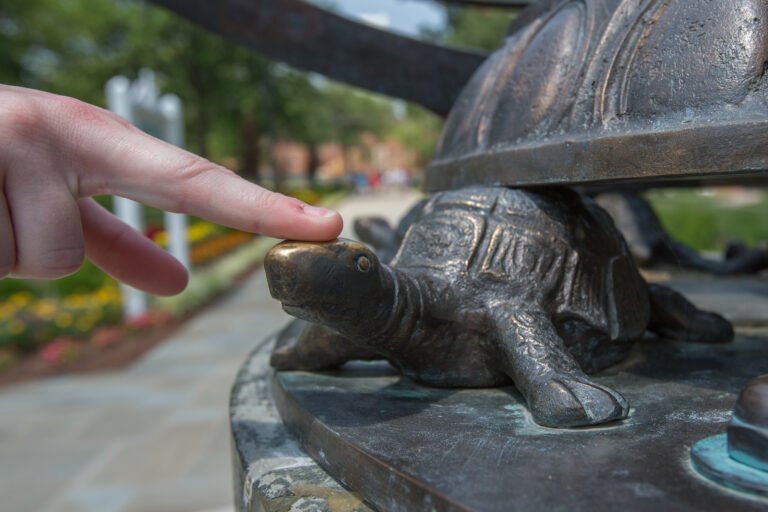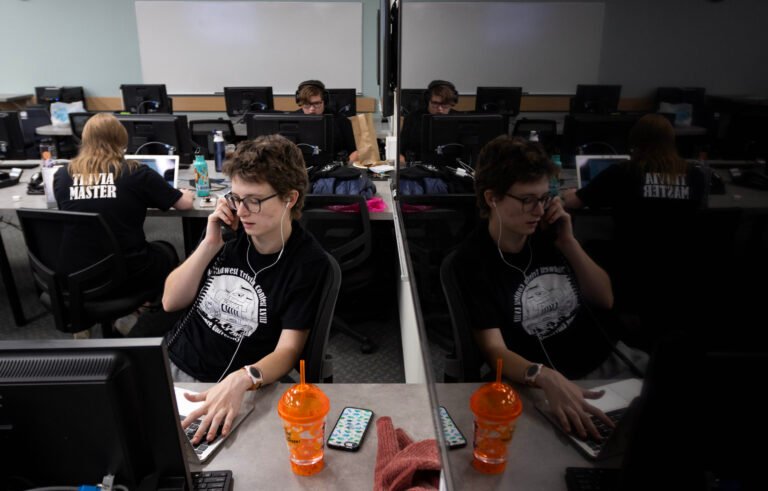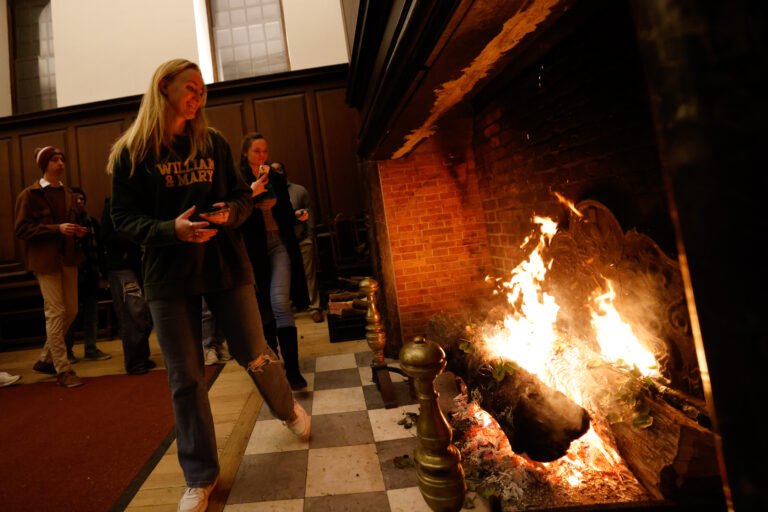Introverted college students can take simple steps to meet others and feel connected to campus.
Many of the ways friendships are forged on campus can be daunting for introverts, but there are other options.
Key Takeaways:
- Introverts are happier when they make social connections.
- They should focus on small steps and low-stakes interactions.
- College is a time when most people are open to making friends.
The adjustments of freshman life – leaving friends and family behind to build new connections and learn in an unfamiliar environment – are challenging for most college students.
But they can be especially difficult for introverts, those who may be shy or reserved, or prefer solitude.
“An introvert gets their energy from being alone and an extrovert gets their energy from being around other people,” says Jessica Pan, author of the book “Sorry I’m Late, I Didn’t Want to Come: An Introvert’s Year of Living Dangerously.” “So imagine if two people go to the same big party with lots of people and three hours later they leave. The introvert would leave feeling drained while the extrovert will often leave feeling energized.”
That means many of the ways friendships are forged on campus – at college games, in lecture halls, through Greek rush or social events – can be daunting for introverts.
Experts say introverted students can do these things to get involved on campus.
Understanding Introversion
Introversion and extroversion are not innate, but relate to people’s expectations and choices about social interactions, says Nicholas Epley, professor of behavioral science at the University of Chicago’s Booth School of Business in Illinois.
It’s not that an extrovert is “somebody who likes talking, whereas an introvert likes doing things alone,” he has explained. “An extrovert is someone who chooses to go out and interact, whereas an introvert chooses to keep to themselves. It’s about expectations, not about experiences.”
“Extroverts are less anxious about reaching out and engaging and connecting with others,” Epley adds, “whereas introverts are more anxious about doing that, and therefore tend to choose to keep to themselves more often.”
Introverts don’t necessarily enjoy social interaction less. Epley says levels of social interaction are often explained more by circumstance than personality: Even a person who considers themselves outgoing will sit alone to write an essay.
But introversion is seen less positively than extroversion in U.S. culture, says Sonja Lyubomirsky, professor of psychology at the University of California, Riverside. She conducted a 2020 study that compared well-being when people were asked to behave like introverts for one week and like extroverts for one week. Researchers avoided using the terms introversion or extroversion during the experiment.
“If we say, ‘Act more extroverted,’ people think, ‘Oh, they want me to do something that is a positive thing,’” says Lyubomirsky, who has been studying happiness for 35 years. Instead, the researchers directed extroverted behavior using neutral terms like talkative, assertive, and spontaneous.
Why It’s Important to Be Involved on Campus
Adjusting to college social life has always been challenging, but experts say the COVID-19 pandemic has exacerbated the problem for many students.
“Some of the (social) skills that students would have typically learned, they have missed the experience of putting those learned skills to work for themselves,” says Marcus Cummings, executive director of the counseling service at Howard University in Washington, D.C.
Getting involved in campus activities and social organizations not only increases a student’s chance of staying enrolled, he says, but it’s also important for their emotional, cultural, and psychological development.
What’s more, research indicates that actively making social connections improves well-being regardless of your personality type.
Lyubomirsky has said her study showed “changing one’s social behavior is a realizable goal for many people, and that behaving in an extraverted way improves well-being,” while Epley points to “a decade and a half of research where we find that effect – that people find social engagement or social interaction not just to be good, but surprisingly good.”
That’s true, Epley adds, “regardless of whether you tend to be an extrovert or an introvert. Introverts are also happier … at the periods of the day where they’re acting more outgoing than when they’re not.”
Tips for Introverted Students
Know Your School’s Resources
Take time to learn about academic and social resources on campus, like writing labs, clubs, tutoring centers, and mental health services. Many students graduate without knowing about them, says Stacey Jackson-Lampley, a licensed psychologist and director of training at Howard’s counseling service.
Then think about where you need support, and use that to decide which activities to get involved in. “If it’s the social side, then perhaps get involved with a group or an organization,” Jackson advises. You can often find clubs and resources via social media.
Focus on Yourself
As you focus on making more connections, set weekly goals, and don’t compare yourself to anyone else, experts advise.
“You don’t have to be the life of the party,” Lyubomirsky says. “I would say (to participants) in our study, ‘Do three more behaviors this week that are a little bit more extroverted.’ So it could be next time you’re having lunch with friends, maybe speak up a little bit more.”
Take Easy Opportunities
Introverted college students can take easy opportunities to meet other students in the cafeteria or the residence hall, or find classmates sitting alone and ask to join them, says Epley, author of “Mindwise: Why We Misunderstand What Others Think, Believe, Feel, and Want.”
You don’t have to tackle crowded spaces like bars and parties, he adds. “Parties are hard for anybody. There are lots of people. You don’t have a chance to talk to anybody. The easy opportunities are one on one when the person is right there.”
Pan suggests simply asking other students about their hometown or what they’re studying. “As soon as you break the ice, most people will instantly become friendly and chatty.”
Make it Your Responsibility
“Nobody waves – but everybody waves back,” Epley writes in “Mindwise,” noting that social life is largely driven by reciprocity.
“Much of our social behavior is in response to what other people are doing or what we think other people are doing,” Epley says, “but we don’t seem to fully appreciate that.”
Pan suggests making the first move instead of wondering why people aren’t talking to you. “Why don’t you make it so that you’re the friendly person or you’re the one making everyone comfortable? I think that mentality can help massively.”
Don’t Be a Prisoner Of Your Expectations
Introverts may be afraid to connect with others because they mistakenly believe people aren’t interested in talking to them. However, experts say students who want to connect with others should assume these interactions will turn out better than they expect.
Pan, who grew up in a small town in Texas and went to Brown University, an Ivy League school in Rhode Island, says she wishes that she had realized as a freshman “that this is the one big time in your life when in most cases, you show up (to an event) and people don’t know anybody – or they know one or two people. So it’s just the time that everyone is open to making friends.”
However, note a couple of caveats here. First, applicants tend to apply early decision to law schools that are just within reach, where they are least likely to receive merit-based scholarships. Second, some law schools automatically provide additional funding to early decision applicants, like the University of California—Berkeley School of Law and Northwestern University’s Pritzker School of Law.
Finally, early-decision applicants must have all their materials together in time to meet early-decision deadlines as early as October or November, although some law schools have a second-round early-decision deadline later. Meanwhile, general application deadlines tend to be around February or March.
Early-decision applicants usually cannot submit later LSAT scores or updated grades unless bumped to the general pool.
Making the Decision
Applicants often try to game out where they can apply early decision to maximize their odds of admission to a highly competitive law school. This can be a tricky balance. Applying early to a school where your odds are slim is unlikely to make a difference while applying early to a school where your odds are more solid will bar you from taking a shot at higher-ranked schools.
Friends Can Help
Extroverts can help their introverted friends by consistently inviting them out. “Even if they say they don’t feel like it one time, keep inviting them out,” Pan says, “because they will eventually say yes.”
But introverts shouldn’t rely too heavily on friends to meet new people, Epley cautions, because that can feed their anxiety about social interactions.
“I think the misplaced fear that we have about just being more sociable, being nice, being appreciative to other people, being kind to other people – all of those are things within your power to go out and do,” he says.
Consider Online Classes
Online classes may help introverts by easing the pressure to speak up in class and making them more visible to their professors.
“You can be recognized very strongly by faculty because if you are sending in writing assignments in the class, it will speak for who you are,” says Jennifer Kahnweiler, author of “The Introverted Leader: Building on Your Quiet Strength.”
Students who take all their classes online may struggle with loneliness or fail to properly develop their communication skills, she adds, so it’s still important to get involved on campus.
Kahnweiler recommends choosing online classes on a case by case, making sure they include virtual office hours and opportunities for engagement.
“If you’re at your computer communicating all day,” she says, “you’re losing that chance to learn about how to understand people better from face-to-face interactions.”






















Leave a Reply